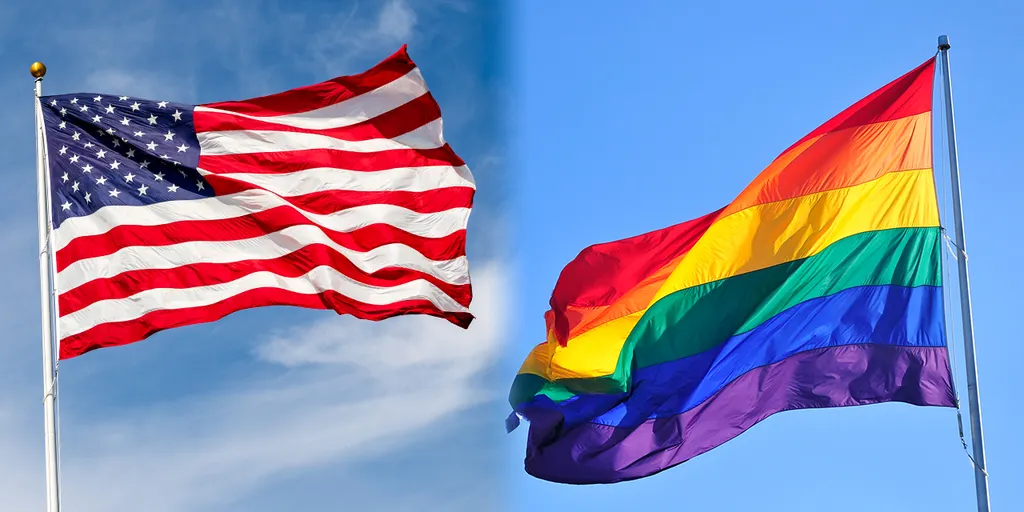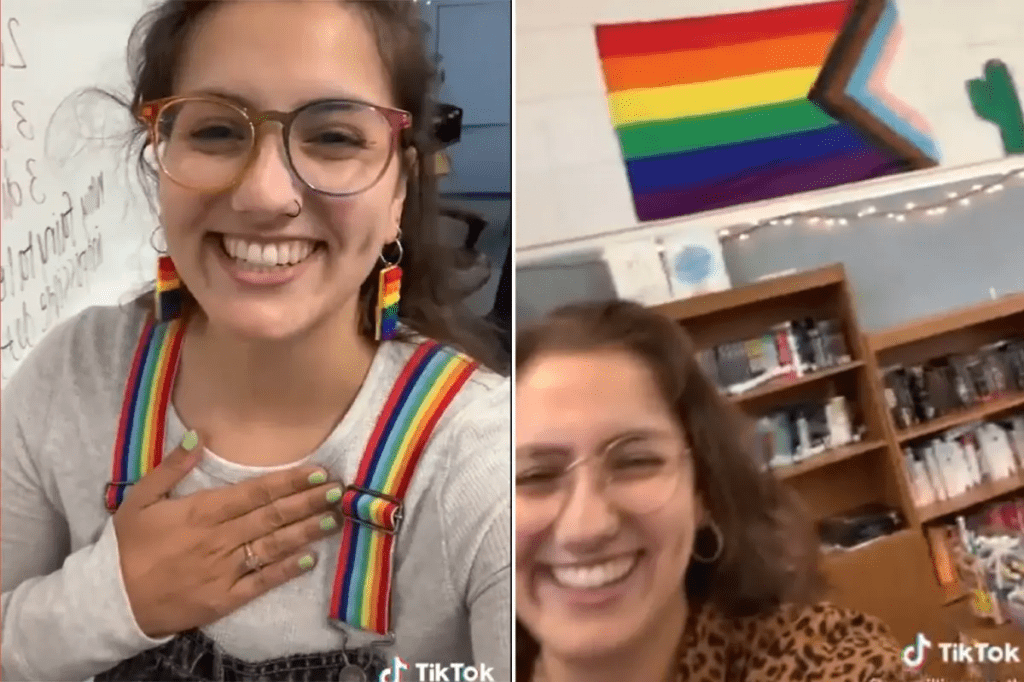Teacher Mocks U.S. Flag And Removes It From Classroom – Makes Kids Pledge Allegiance To Pride Flag
The actions of Kristin Pitzen, a teacher from Orange County’s Newport Mesa School District, have ignited a firestorm of controversy nationwide. In a now-deleted TikTok video, Pitzen explained how she removed the American flag from her classroom, citing discomfort, and encouraged her students to pledge allegiance to the Pride flag instead. This incident has sparked heated discussions about educators’ responsibilities, patriotism, and inclusivity in schools.

What Happened in Kristin Pitzen’s Classroom?
Pitzen, a teacher known for her vibrant and inclusive classroom decorations, shared a TikTok video in 2021 that went viral for all the wrong reasons. In the video, she laughingly described how she removed the American flag from her classroom, claiming it made her feel “uncomfortable.”
She admitted to storing the flag away, adding, “I packed it away and I don’t know where, and I haven’t found it yet.” Pitzen revealed that during the Pledge of Allegiance, students were given the option to stand, sit, or recite the words—emphasizing that participation was entirely voluntary.
When one student asked what they should look at during the pledge, Pitzen pointed to the Pride flag on the wall and jokingly suggested it could serve as an alternative.
Community Outrage and Backlash
The TikTok clip, though quickly removed, spread rapidly across social media, drawing sharp criticism from parents, community members, and netizens. Many viewed Pitzen’s actions as disrespectful to the American flag—a symbol of national unity and sacrifice.
Parental Reactions
Parents in the district were particularly vocal about their concerns. One mother, Michele Vaughn, whose son serves in the military, expressed her disappointment:
“I’d like to share with her the importance of respecting the flag. It’s a symbol of the freedom and rights we enjoy today.”
Several parents responded by planting American flags on the school lawn as a statement of patriotism.
Online Fury
Social media exploded with criticism, with many users accusing Pitzen of indoctrinating students and disrespecting the sacrifices made by veterans. One commenter noted:
“The flag represents the freedom you enjoy today. It’s a living symbol of those who fought for the rights you have now.”
Others questioned her understanding of the significance of national symbols, with one remarking:
“You insult the flag, which stands for our country and those who defend it? Maybe she’d prefer living in Afghanistan.”

The School District’s Response
Following the uproar, the Newport Mesa School District confirmed that Pitzen was no longer teaching in the classroom. In a public statement, the district emphasized its commitment to inclusivity while reiterating the importance of respecting national symbols:
“Showing respect for the nation’s flag is a core value we instill in our students, alongside fostering an inclusive and welcoming learning environment.”
While Pitzen has since deleted her social media profiles, the district’s investigation into the incident continues. It remains unclear whether further disciplinary actions will be taken.
A Broader Discussion: Inclusivity vs. Patriotism
This incident has ignited a broader debate about balancing inclusivity with respect for national symbols in schools. On one hand, educators are tasked with fostering diverse and welcoming environments for all students. On the other, they are expected to uphold traditions and values, including reverence for the American flag.
The Role of Educators in Shaping Values
Teachers play a critical role in shaping the values of future generations. While inclusivity is vital, many believe it should not come at the expense of national pride and respect for the flag. Critics argue that Pitzen’s actions blurred the line between promoting inclusivity and undermining patriotic traditions.
Free Speech vs. Professional Responsibility
Pitzen’s defenders highlight her right to free speech and her efforts to create an inclusive classroom for LGBTQ+ students. They argue that her actions, though controversial, were meant to support marginalized communities. However, opponents contend that as a public servant, she had a professional responsibility to maintain neutrality and respect universally accepted symbols.

The Importance of National Symbols in Education
National symbols like the American flag carry deep historical and cultural significance. They serve as reminders of shared values and sacrifices, uniting citizens across diverse backgrounds.
Why the Flag Matters
For many, the American flag represents freedom, democracy, and the sacrifices made by those who served the country. In schools, displaying the flag serves as a teaching tool, instilling respect for national heritage and the ideals of unity and liberty.
Balancing Inclusivity and Patriotism
Creating an inclusive environment does not necessarily require sidelining national symbols. Instead, educators can teach students to appreciate diversity while fostering respect for the country’s shared values.
The Aftermath of the Incident
The controversy surrounding Kristin Pitzen has left a lasting impact on her community and beyond. It has prompted discussions about the responsibilities of educators, the meaning of patriotism, and the importance of inclusivity in modern classrooms.
Public Opinion Remains Divided
While some see Pitzen’s actions as a betrayal of national values, others view them as a bold statement of support for LGBTQ+ students. This divide highlights the challenges educators face in navigating sensitive topics in increasingly polarized environments.
Lessons for Schools Nationwide
Schools across the country can learn from this incident by implementing clearer guidelines on the display of national symbols and fostering open dialogue about inclusivity and respect.
Conclusion: A Call for Balance and Respect
The uproar over Kristin Pitzen’s actions underscores the need for balance in education. Teachers must navigate the complex intersection of inclusivity, free speech, and patriotism while respecting the diverse values of their students and communities.
As debates about this incident continue, one thing is clear: educators have a unique responsibility to foster understanding and respect, both for individual identities and for the shared symbols that unite us as a nation.






